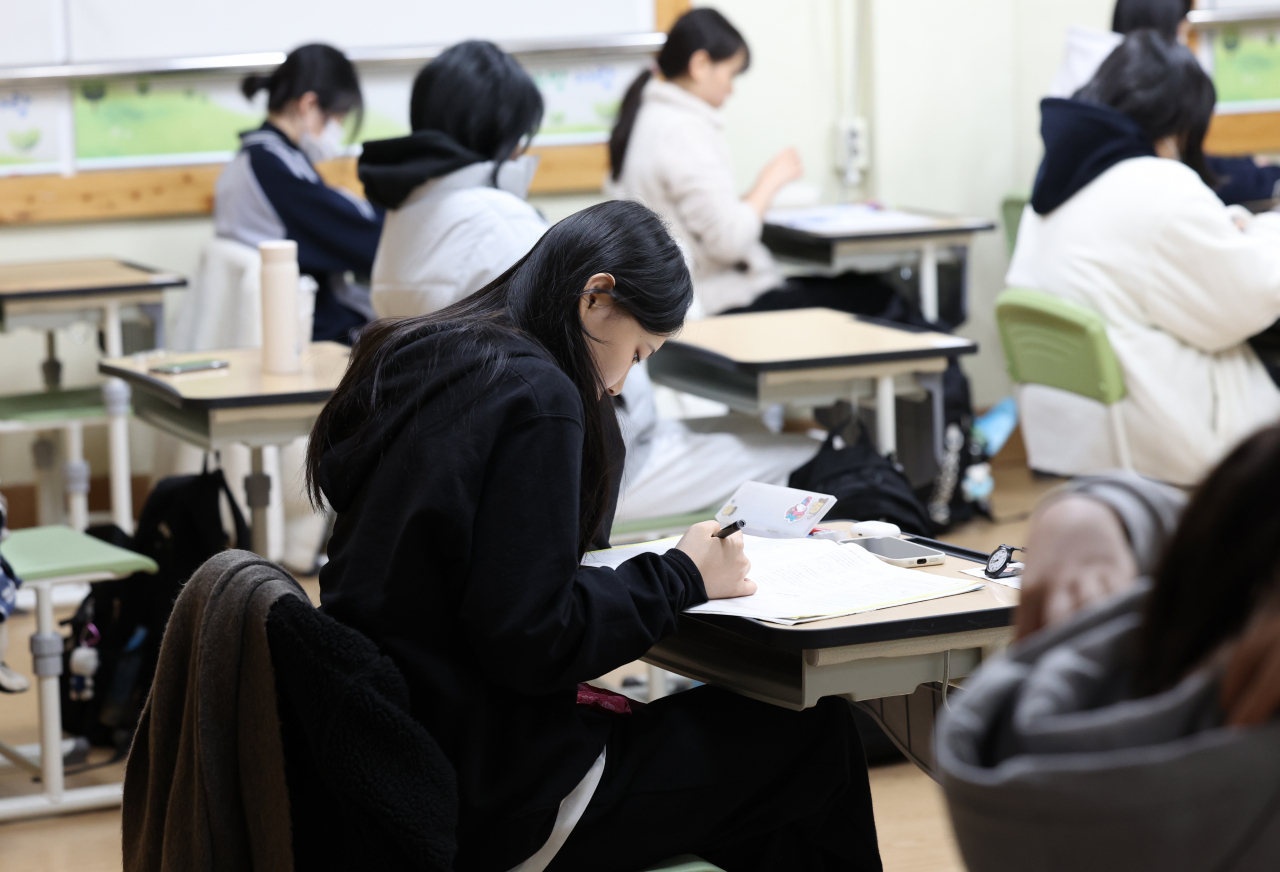Suneung without 'killer questions' still not easy, results show
Only one perfect score among over 440,000 test-takers this year
By Choi Jeong-yoonPublished : Dec. 7, 2023 - 18:20

Test-takers of South Korea’s national college entrance exam, known as the Suneung, are set to receive their test results Friday, amid lingering controversy over whether this year's test succeeded in completely scrapping the highly difficult “killer questions.”
Results and analysis of over 440,000 examinees released by the Korea Institute for Curriculum and Evaluation on Thursday suggested that exams in all subjects, including Korean language, mathematics and English, were more challenging than last year, especially for top test-takers.
In the case of Korean language, the score gap between the top test-takers and those with average scores widened, as the highest standard score for this year's exam was 150, a 16-point jump from last year. This tied with the 2019 test, which held the record as the highest in Suneung history.
The highest standard score typically increases when the test is difficult or tricky, as the average score drops. If the highest score is near 150, it is considered that the test was "grueling."
The number of students who received perfect scores on the section dropped significantly as well, to only 64, a noticeable decline from last year's 371 examinees.
The math section was slightly harder than last year's exam as well, with its maximum standard score marking 148 points, up three points from last year's exam. The English section also had the lowest percentage in the first-tier group since the scoring system changed from the previous curved grading system to score-based “absolute grading.”
Only 4.71 percent of test-takers were counted among the first tier, meaning those who received over 90 points, the lowest number since the system changed in 2018.
The Education Ministry, however, evaluated this year's exam had successfully excluded all "killer questions,” while managing to differentiate the levels of students in the top category.
The education authority was firm on the stance that this year's focus was coming up with questions within the boundary of public education, and they achieved their goal of restoring trust in public education. Two recents survey showed, however, that 75 percent of teachers thought that killer questions had not actually been removed from the test and that some 86 percent of test-takers still found the full exam to be arduous.
"Killer questions are not a matter of whether the questions are easy or difficult. It's about excluding questions that require the problem-solving skills taught in private education," said Oh Seung-keol, president of the Korea Institute for Curriculum and Evaluation, which administers Suneung.
"Questions that require a high level of problem-solving method outside of the materials taught in school are what the ministry defines as killer questions," he restated, emphasizing that all questions of this year's exam were covered within the public education system.
However, experts on the matter say the ambiguity and unsettled consensus on the definition of "killer questions" is the reason behind the discrepancy between the government and test-takers.
"The institute tried their best to differentiate the highest ranking students without killer questions. But students and parents would disagree, as so-called 'killer questions,' to them, are extremely difficult and tricky questions," Lee Man-ki, vice president of Uway Educational Assessment Research Institute, told The Korea Herald.
He added that the total exclusion of killer questions, as the government defines them, would still lead students to pursuing private education to tackle the test.
"The fundamental aspect lies in competition. Because the test requires relative evaluation, in order to do better than one's competitors examinees will have no choice but to do extra," he said. "In order to survive in Korea, it's inevitable to turn to private education, that's reality."
Earlier in June, as part of President Yoon Suk Yeol's drive to reform education, the Education Ministry announced that it would eliminate killer questions from the Suneung to tackle the necessity of students turning to private academies for test preparation.



















![[Today’s K-pop] Treasure to publish magazine for debut anniversary](http://res.heraldm.com/phpwas/restmb_idxmake.php?idx=642&simg=/content/image/2024/07/26/20240726050551_0.jpg&u=)